第10届韩国语TOPIK高级标准答案
词汇xiazaiwangzhi

词汇/down_85729.html【词汇】常用的反义词韩国语.pdf /down_85730.html【词汇】韩国常用的量词.pdf /down_85731.html【词汇】韩国语生活词汇396句.pdf /down_85726.html【词汇】化妆相关常用汇词.pdf /down_85728.html【词汇】实务韩国语能力考试重要词汇目录.pdf/down_85727.html【词汇】在韩国常用的外来语.pdf 会话/down_85739.html【会话】韩国语常用口语短句158句.pdf/down_85734.html【会话】买衣服时常用的韩国语.pdf /down_85738.html【会话】在餐厅常用的韩国语.pdf /down_85736.html【会话】在美发店常用的韩国语.pdf /down_85735.html【会话】在医院常用的韩国语.pdf /down_85737.html【会话】在银行常用的韩国语.pdf 软件本帖隐藏的内容需要回复才可以浏览/down_85853.html HwpViewer阅读器.rar/down_85854.html IME2007_KOR.rar/down_85855.html QQ韩文输入程序.rar/down_85856.html发音Flash.rar/down_85865.html韩国语输入法IMEKOR2007.exe /down_85866.html韩文外来语翻译器.rar/down_85867.html韩语初学者必备电子书.exe /down_85868.html韩语打字练习软件.exe/down_85869.html韩语翻译软件一典通4.0.exe /down_85870.html韩语自动隔写空格器.rar/down_85857.html宏越融睿学者--常用韩语V1.00破解版.exe/down_85861.html灵格斯词霸v1.0.rar/down_85864.html迷你韩语字典.rar/down_85862.html瑞词·韩语Smartword.KR1.0(韩语单词记忆软件).exe/down_85860.html无密版标准韩国语二册.exe /down_85859.html无密版标准韩国语三册.exe /down_85858.html无密版标准韩国语一册.exe /down_85863.html系统自带韩语输入法.exe 语法/down_85872.html【语法】_韩国语的主格助词.pdf /down_85887.html【语法】韩国语的词性-代名词.pdf /down_85890.html【语法】韩国语的词性-动词.pdf /down_85889.html【语法】韩国语的词性-副词.pdf /down_85894.html【语法】韩国语的词性-感叹词.pdf /down_85888.html【语法】韩国语的词性-冠形词.pdf/down_85892.html【语法】韩国语的词性-名词.pdf /down_85895.html【语法】韩国语的词性-数词.pdf /down_85893.html【语法】韩国语的词性-形容词.pdf /down_85891.html【语法】韩国语的词性-助词.pdf /down_85886.html【语法】韩国语的否定表现.pdf /down_85884.html【语法】韩国语的句子成分.pdf /down_85885.html【语法】韩国语的句子构成.pdf /down_85896.html【语法】韩国语的音变现象.pdf /down_85883.html【语法】韩国语的元音和辅音.pdf /down_85873.html【语法】韩国语会话.pdf/down_85882.html【语法】韩国语将来时.pdf /down_85881.html【语法】韩国语句子的连接.pdf /down_85875.html【语法】韩国语句子的时制用法.pdf /down_85879.html【语法】韩国语句子的种类-感叹句.pdf/down_85876.html【语法】韩国语句子的种类-共动句.pdf/down_85878.html【语法】韩国语句子的种类-命令句.pdf/down_85877.html【语法】韩国语句子的种类-叙述句.pdf/down_85880.html【语法】韩国语句子的种类-疑问句.pdf/down_85874.html【语法】韩国语修辞法.pdf /down_85897.html【语法】韩国语音的长短、声调、连接.pdf/down_85898.html【语法】韩国语音韵变化和标准发音—_辅音同化.pdf/down_85899.html【语法】韩国语音韵变化和标准发音—紧音化.pdf topik考试/down_85901.html 18届TOPIK实务考试(B-TOPIK).zip/down_85903.html 18届TOPIK真题(初级).zip /down_85904.html 18届TOPIK真题(高级).zip /down_85902.html 18届TOPIK真题(中级).zip /down_85905.html 19届TOPIK实务考试(B-TOPIK).zip/down_85907.html 19届TOPIK真题(初级).zip /down_85908.html 19届TOPIK真题(高级).zip /down_85906.html 19届TOPIK真题(中级).zip /down_85911.html 2008年4月TOPIK真题(初级).rar/down_85912.html 2008年4月TOPIK真题(初级)标准答案.rar/down_85913.html 2008年4月TOPIK真题(高级).rar/down_85914.html 2008年4月TOPIK真题(高级)标准答案.rar/down_85909.html 2008年4月TOPIK真题(中级).rar/down_85910.html 2008年4月TOPIK真题(中级)标准答案.rar/down_85915.html 2010年2月17届TOPIK真题.zip /down_85916.html TOPIK必备单词2008版.rar /down_85917.html TOPIK必备单词(1-6级).rar /down_85918.html韩语等级考试必备单词Topik(1-6级).rar/down_85744.html【考试】韩国语能力考试(TOPIK)初级A_-_2010年_第19次初级A考试.zip/down_85745.html【考试】韩国语能力考试(TOPIK)初级B_-_2010年_第19次初级B考试.zip/down_85746.html【考试】韩国语能力考试(TOPIK)初级听力_-_2010年_第19次初级听力考试.zip/down_85751.html【考试】韩国语能力考试(TOPIK)高级A_-_2010年_第19次高级A考试.zip/down_85752.html【考试】韩国语能力考试(TOPIK)高级B_-_2010年_第19次高级B考试.zip/down_85753.html【考试】韩国语能力考试(TOPIK)高级听力_-_2010年_第19次高级听力考试.zip/down_85747.html【考试】韩国语能力考试(TOPIK)实务A_-_2010年_第19次实务A考试.zip/down_85748.html【考试】韩国语能力考试(TOPIK)实务B_-_2010年_第19次实务B考试.zip/down_85749.html【考试】韩国语能力考试(TOPIK)实务听力A_-_2010年_第19次实务A听力考试.zip/down_85750.html【考试】韩国语能力考试(TOPIK)实务听力B_-_2010年_第19次实务B听力考试.zip/down_85741.html【考试】韩国语能力考试(TOPIK)中级A_-_2010年_第19次中级A考试.zip/down_85742.html【考试】韩国语能力考试(TOPIK)中级B_-_2010年_第19次中级B考试.zip/down_85743.html【考试】韩国语能力考试(TOPIK)中级听力_-_2010年_第19次中级听力考试.zip 课件/down_85762.html《标准韩国语》第二册课后题答案.zip/down_85761.html《标准韩国语》第三册课后题答案.zip/down_85758.html《初级写作教程1》.rar/down_85759.html《初级写作教程2》.rar/down_85763.html《韩国的文化象征》.zip/down_85760.html《无师自通韩国语》教材下载(PDF1-19).pdf/down_85765.html【2008年版】第1~4课元音,辅音1.rar/down_85764.html【2008年版】第11~12课收音2.rar/down_85766.html【2008年版】第5~6课元音,辅音2.rar/down_85767.html【2008年版】第7~8课元音,辅音3.rar/down_85768.html【2008年版】第9~10课收音1.rar /down_85755.html 150个最常用的词.doc/down_85756.html bebeline.swf/down_85757.html typing_system.swf/down_85800.html标韩第二册课文翻译.doc/down_85799.html标韩第三册课文翻译.doc/down_85798.html标韩第一册课文翻译.docrar /down_85797.html标准韩国语1-3册mp3.rar /down_85789.html常用韩语语法格式总结表.rar /down_85787.html常用语.xls/down_85788.html常用语分析.xls/down_85793.html抽象概念惯用语.doc/down_85778.html初级中级韩语语法学习.rar/down_85777.html初学韩语经验.doc/down_85803.html第三册.doc/down_85783.html发音及其变音.doc/down_85792.html房地产韩国语.doc/down_85811.html跟韩亚娄老师在线学韩语发音.txt /down_85815.html韩国“国立国语院”统计的词频6000词.rar/down_85816.html韩国地名(中韩对照).rar/down_85817.html韩国汉字成语.doc/down_85818.html韩国语1语法汇总1.doc/down_85820.html韩国语变音规则.rar/down_85821.html韩国语的数词辅导讲义.rar/down_85819.html韩国语书写教材.rar/down_85836.html韩语打电话用语.doc/down_85832.html韩语单词.doc/down_85833.html韩语发音.swf/down_85834.html韩语发音的基本的规则.rar/down_85843.html韩语键盘.jpg/down_85840.html韩语讲义.pdf/down_85839.html韩语聊天必备.doc/down_85838.html韩语罗马拼音转换器.rar/down_85831.html韩语入门电子书.rar/down_85829.html韩语入门基础教程音频.swf /down_85830.html韩语入门学习建议音频.swf /down_85824.html韩语三百句MP3(10-16).rar /down_85825.html韩语三百句MP3(17-22).rar /down_85823.html韩语三百句MP3(1-9).rar/down_85826.html韩语三百句MP3(23-30).rar /down_85837.html韩语数字学习儿童flash.rar /down_85842.html韩语跆拳道术语.doc/down_85835.html韩语听写表.xls/down_85822.html韩语一级词汇必备.rar/down_85844.html韩语音节表升级版.rar/down_85841.html韩语语法大全WORD文档.rar /down_85828.html韩语元音和辅音.doc/down_85827.html韩语中的惯用句型及词组.rar /down_85780.html化妆品相关韩国语.doc/down_85784.html基本发音表.xls/down_85786.html家庭.doc/down_85810.html课表2.jpg/down_85802.html浪漫满屋剧本韩文对白.rar/down_85812.html连结词尾.doc/down_85813.html连音.doc/down_85805.html罗马音表.doc/down_85851.html马上说韩语电子书.doc/down_85801.html每课单词.doc/down_85806.html美国密西根大学使用的韩国语教材电子书(中.rar/down_85791.html情感.doc/down_85774.html人称代词用法总结.doc/down_85781.html十款实用的韩语字体.rar/down_85785.html实用简明韩语语法表下载版.rar /down_85794.html收音完整收费版.doc/down_85849.html首尔大学韩国语1-17课.wma /down_85850.html首尔大学韩国语18-30课.wma /down_85782.html双元音的拼成.doc/down_85773.html为女性结婚移民者准备的《中级韩语》.zip/down_85796.html无师自通韩国语随书mp3下载.zip /down_85795.html新速成韩国语.rar/down_85790.html形容词的动词化.doc/down_85769.html一课.rar/down_85775.html依存名词.doc/down_85814.html阴阳性元音.doc/down_85845.html音变.doc/down_85846.html音变讲义.doc/down_85847.html音标图.gif/down_85848.html音阶表.rar/down_85807.html语法总结标韩1.doc/down_85808.html语法总结标韩2.doc/down_85809.html语法总结标韩3.doc/down_85776.html元音加辅音.doc/down_85770.html中国传统礼仪调查表.doc/down_85771.html中韩交流标准韩国语第一册第一单元.rar/down_85772.html中韩语汉字对照表.doc/down_85804.html终结语尾.doc/down_85779.html助词.doc隐藏内容截图:================================================ ==============。
韩国语能力测试(TOPIK)-常见问题
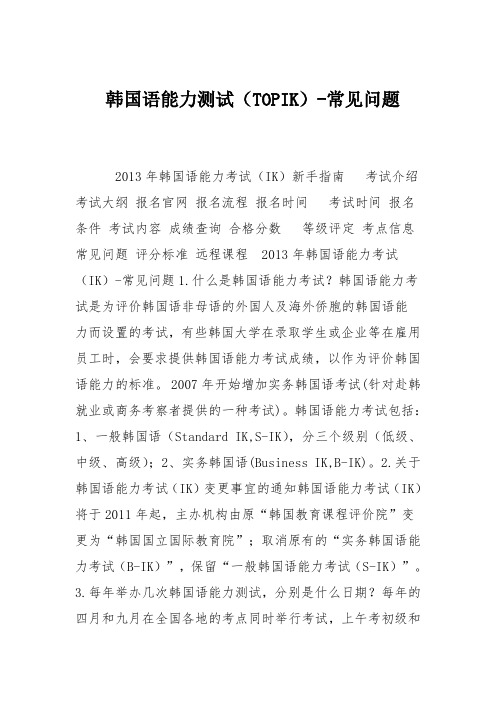
韩国语能力测试(TOPIK)-常见问题2013年韩国语能力考试(IK)新手指南考试介绍考试大纲报名官网报名流程报名时间考试时间报名条件考试内容成绩查询合格分数等级评定考点信息常见问题评分标准远程课程 2013年韩国语能力考试(IK)-常见问题1.什么是韩国语能力考试?韩国语能力考试是为评价韩国语非母语的外国人及海外侨胞的韩国语能力而设置的考试,有些韩国大学在录取学生或企业等在雇用员工时,会要求提供韩国语能力考试成绩,以作为评价韩国语能力的标准。
2007年开始增加实务韩国语考试(针对赴韩就业或商务考察者提供的一种考试)。
韩国语能力考试包括:1、一般韩国语(Standard IK,S-IK),分三个级别(低级、中级、高级);2、实务韩国语(Business IK,B-IK)。
2.关于韩国语能力考试(IK)变更事宜的通知韩国语能力考试(IK)将于2011年起,主办机构由原“韩国教育课程评价院”变更为“韩国国立国际教育院”;取消原有的“实务韩国语能力考试(B-IK)”,保留“一般韩国语能力考试(S-IK)”。
3.每年举办几次韩国语能力测试,分别是什么日期?每年的四月和九月在全国各地的考点同时举行考试,上午考初级和高级,下午考中级和实务韩国语(考生即可报名参加上午的考试,也可同时报名参加下午的考试)。
从2007年9月份开始的韩国语能力考试(IK)将实行网上报名。
4.报名前需要做哪些准备工作?网上报名要求电脑应与互联网连接并且装有网络浏览器(是IE浏览器)。
推荐显示分辨率为1024X768。
必须使用简体中文操作系统输入汉字。
注意:在汉字输入状态下,必须采取半角方式输入数字。
哪些注册信息是不可以更改的?姓名(包括中文姓名和拼音)、性别、证件类型和证件号码、出生日期。
5.如何报名参加考试?是否需要到考点报名?采取网上报名的方式。
考生可直接上网填写报名表,网上支付考费,考点不受理报名事宜。
报名网址是或6.今年的报名名额是否有限制?根据各考点的容量报名,报满为止。
完整word版)韩国语能力考试TOPIK中高级语法

完整word版)韩国语能力考试TOPIK中高级语法1.“高过来/去”用于动词后,表示“在完成某个动作或者保持某个动作的情况下去/来。
”。
使用“去”或“来”要根据说话人实际所处的位置或说话人心理所处的位置而定。
1)表示“在完成前一个动作的情况下去/来。
”例如:我见了朋友再来的。
今天先完成这个工作再走吧。
2)表示“在保持前一个动作的情况下去/来。
”当前一个动作是持续的肢体动作时,表示“在保持该动作的状态下去/来。
"。
类似于汉语里的“。
着来/去。
”。
例如:穿着衣服去。
坐着公交车来的。
补充说明:高过来/去”与“-去/来”的比较:高过来/去”指“一个动作完成之后再去/来。
”,涉及两个动作。
而“-去/来”表示某一动作或状态从现在向未来或从过去向现在持续地进行。
2.“有一种感觉”表示“说话人虽然产生了某种念头、想法,但是并不确定。
”例如:虽然有点晚了,但还是从现在开始吧。
3.“好像是”1)通常用于话者向对方陈述自己的想法或意见,但并不强硬地主张和推断,语气委婉、谦逊或消极。
例如:学校正门前的饭店好像很好吃。
2)“-将会是”的推测是现在可能正发生的事情,推测将来某种情况用“-将会是”。
推测过去发生的事情动词后接(으)ㄴ것같다,形容词或이다后接“았던것같다”。
例如:昨天的聚会好像来了很多人。
4.“好像正在进行”表示说话人所回想的动作当时正在进行,为了突然出“正在进行”,常用“-正在进行”的形式加以强调。
例如:发生事故时,卡车司机好像正在打瞌睡。
他好像还记得我。
5.“好像是/会是/应该是”表示“感觉某一动作、状态或事实与前面的动作、状态或事实相似”。
与“好像是”的比较,更加突出“不是别的,就是那样”。
例如:一定会下雨。
因为风的缘故,好像有人来了。
6.V/N+“-按照。
的方式”表示按照某人的意志或一定得标准行动,可用于动词或名词之后;表示“一。
就。
”意义时,只能接在动词之后,表示一个动作接着另一个动作进行。
(完整word版)韩国语能力考试TOPIK中高级语法
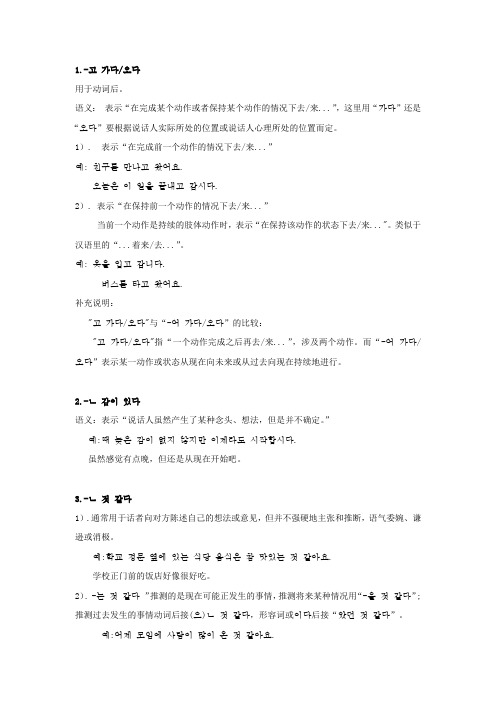
1.-고가다/오다用于动词后。
语义:表示“在完成某个动作或者保持某个动作的情况下去/来...”,这里用“가다”还是“오다”要根据说话人实际所处的位置或说话人心理所处的位置而定。
1). 表示“在完成前一个动作的情况下去/来...”예: 친구를만나고왔어요.오늘은이일을끝내고갑시다.2). 表示“在保持前一个动作的情况下去/来...”当前一个动作是持续的肢体动作时,表示“在保持该动作的状态下去/来..."。
类似于汉语里的“...着来/去...”。
예: 옷을입고갑니다.버스를타고왔어요.补充说明:"고가다/오다"与“-어가다/오다”的比较:"고가다/오다"指“一个动作完成之后再去/来...”,涉及两个动作。
而“-어가다/오다”表示某一动作或状态从现在向未来或从过去向现在持续地进行。
2.-ㄴ감이있다语义:表示“说话人虽然产生了某种念头、想法,但是并不确定。
”예:때늦은감이없지않지만이제라도시작합시다.虽然感觉有点晚,但还是从现在开始吧。
3.-ㄴ것같다1).通常用于话者向对方陈述自己的想法或意见,但并不强硬地主张和推断,语气委婉、谦逊或消极。
예:학교정문옆에있는식당음식은참맛있는것같아요.学校正门前的饭店好像很好吃。
2).-는것같다”推测的是现在可能正发生的事情,推测将来某种情况用“-을것같다”;推测过去发生的事情动词后接(으)ㄴ것같다,形容词或이다后接“았던것같다”。
예:어제모임에사람이많이온것같아요.昨天的聚会好像来了很多人。
4.-던것같다表示说话人所回想的动作当时正在进行,为了突然出“正在进行”,常用”-고있었던것같다"的形式加以强调。
예:사고가날때트럭운전수는졸고있었던것같다.그분은나를기억하고있었던것같습니다.5.-는/ㄴ/ㄹ것만같다表示“感觉某一动作、状态或事实与前面的动作,状态或事实相似”。
与“-는것같다”相比,更加突出“不是别的,就是那样”。
TOPIK常用语法
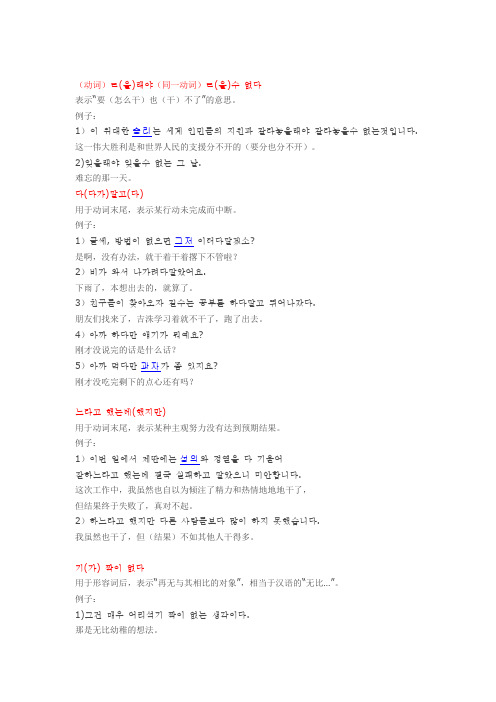
(动词)ㄹ(을)래야(同一动词)ㄹ(을)수없다表示“要(怎么干)也(干)不了”的意思。
例子:1)이위대한승리는세계인민들의지원과갈라놓을래야갈라놓을수없는것입니다. 这一伟大胜利是和世界人民的支援分不开的(要分也分不开)。
2)잊을래야잊을수없는그날.难忘的那一天。
다(다가)말고(다)用于动词末尾,表示某行动未完成而中断。
例子:1)글쎄, 방법이없으면그저이러다말겠소?是啊,没有办法,就干着干着撂下不管啦?2)비가와서나가려다말았어요.下雨了,本想出去的,就算了。
3)친구들이찾아오자길수는공부를하다말고뛰어나갔다.朋友们找来了,吉洙学习着就不干了,跑了出去。
4)아까하다만얘기가뭐예요?刚才没说完的话是什么话?5)아까먹다만과자가좀있지요?刚才没吃完剩下的点心还有吗?느라고했는데(했지만)用于动词末尾,表示某种主观努力没有达到预期结果。
例子:1)이번일에서제딴에는성의와정열을다기울어잘하느라고했는데결국실패하고말았으니미안합니다.这次工作中,我虽然也自以为倾注了精力和热情地地地干了,但结果终于失败了,真对不起。
2)하느라고했지만다른사람들보다많이하지못했습니다.我虽然也干了,但(结果)不如其他人干得多。
기(가) 짝이없다用于形容词后,表示“再无与其相比的对象”,相当于汉语的“无比…”。
例子:1)그건매우어리석기짝이없는생각이다.那是无比幼稚的想法。
2)이좋은소식을들은우리들은반갑기짝이없다.我们听到了这个好消息,无比高兴。
3)그여자가이치마를입은후에예쁘기짝이없다.那个女孩子床上这个裙子后无比的漂亮。
4)입사한후처음에월급을받은그여자반갑기짝이없다.入社后第一次拿到薪水的那个女孩子无比的高兴。
(으)ㄹ까요?表示1、说话人不了解情况,猜测;2、了解情况但意在让听者猜测。
例子:1)晚上喝了咖啡会睡不着吗?저녁에커피를마시면잠이안올까요?2)谁将当选下任总统?다음대통령으로누가당선될까요?3)저두사람이언재견혼할까요? 他们两人什么时候结婚呢?4)글쎄요. 나도모르겠어요. 是啊,我也不知道。
【优质文档】韩国语能力考试试题-精选word文档 (8页)

本文部分内容来自网络整理,本司不为其真实性负责,如有异议或侵权请及时联系,本司将立即删除!== 本文为word格式,下载后可方便编辑和修改! ==韩国语能力考试试题篇一:【蔚蓝留学】韩国语能力考试真题精解及模拟800题(中级)韩国语能力考试真题精解及模拟800题(中级)目录第一篇 TOPIK考试介绍1第二篇历年真题分析 17第一章词汇〃语法领域 17 Ⅰ.题型分析 /181.选择填空题/182.选择近义项/183.选择反义项/214.选择多义词/225.选择错误项/236.选择正确项/237.选择意思不同项 /248.问答题/25Ⅱ.考核点分析 /251.词汇考核点/261)名词 2)形容词 3)动词 4)副词5)惯用词组6)俗语、成语2.语法考核点/571)助词2)连接词尾3)定语词尾4)时制词尾5)待遇法(尊敬/非尊敬)6)否定形7)使动、被动8)回想法9)间接引语10)其他惯用型第二章写作领域 99Ⅰ.客观题 /991.对话题 /992.连句题 /1243.选择可替项/1294.选择内容不符项 /1375.补完题(客观题型)/144 Ⅱ.主观题/1541.造句题 /1542.补完题(主观题型)/155 Ⅲ. 作文题/1631.作文写作的基本要求 /1642.作文的写作技巧 /1653.句子的写作技巧 /1674.段落的写作技巧 /1715.开头的写作技巧 /1796.结尾的写作技巧 /1807.书写规范 /1818.参考阅读文/182第三章听力领域 1931.图片题 /1942.完成对话题/1983.主题题 /2044.选择内容相符项 /2105.判断人物观点 /2156.推断人物行为 /2197.问答题 /223第四章阅读理解领域2291.选择内容相符项 /2302.选择内容不符项 /2423.话题题 /2514.主旨题(中心思想题) /2595.补完题 /2666.理序题 /2707.问答题 /275第三篇模拟练习800题304Ⅰ.词汇、语法部分模拟550题/304Ⅱ.写作部分模拟150题/341Ⅲ.阅读理解部分模拟100题 /360模拟题参考答案 /385附录附录1:近义语整理 /389附录2:反义语整理 /402附录3:惯用词组、俗语和成语整理/411 附录4:常用单词的使动、被动整理/439 编者语。
TOPIK考试

TOPIK考试(Test of Proficiency in Korean)是由韩国教育课程评价院主管的韩国语能力考试。
考试对象主要是不以韩国语为母语的外国人或海外韩侨等。
实施考试的主要目的是在世界范围内推广和普及韩国语,并为外国人赴韩留学以及到韩企就业提供客观的韩国能力评价标准。
TOPIK考试成绩为韩国政府、企业及学校普遍承认。
TOPIK考试的前身为KPT考试(Korean Proficiency Test),从1997年开始到2005年为止一共举行了九届。
考卷分为初、中、高共三套试卷。
只需考一套考卷就可能获得1级或2级的证书。
在评级方法上,虽然报考的级别为三个,但最终颁发的证书仍然是1级到6级总共六个级别。
考试日期:每年举行两次,一般在每年的4月和9月前后进行,具体的考试日期可参见TOPIK 考试的官方网站(http://www.topik.or.kr)或教育部考试中心海外考试报名信息网()评价领域第一卷:表现卷【词汇.语法、写作】第二卷:理解卷【听力、阅读理解】即TOPIK考试由“词汇.语法”、“写作”、“听力”、和“阅读理解”四个评价领域(单科)组成。
每个评价领域占100分,总分400分。
试题构成从2006年开始,TOPIK考试只在写作领域出现主观题,其他三个领域均为只出现客观题。
除写作之外,其他三个领域的试题数一般为30~35题,但从历史情况来看基本上固定为30题。
写作领域既有主观题又有客观题,客观题一共有10题,共40分;主观题只有5-7题,从06和07年的实际情况来看,主观题总共为7题,其中6题为连词成句题或补完题等,每题各占5分,共30分。
最后一道题为作文题,占30分。
通过以上这些数字可以看出:第一,TOPIK考试每题的分值都至少在3分以上,主观题所占分值更高;第二,除了主观题之外,客观题每题的分值相差不大,最多只有1分的差异。
考试时间休息时间。
第一场考“表现卷”,包括“词汇.语法”和“写作”两个单科;第二场考“理解卷”,包括“听力”和“阅读理解”两个单科。
韩国语能力考试(TOPIK)中级真题解析(2)

韩国语能力考试(TOPIK)中级真题解析(2)※ [6~9] 다음밑줄친부분과의미가비슷한것을고르십시오.6. 그는언제나형편이어려운이웃을따뜻하게보살펴준다. (3점)①붙잡아②일으켜③돌보아④이끌어正确答案:③首先解释一下各项词语的意思:①붙잡다抓住,留住②일으키다引起,创办,振兴③돌보다照顾,招呼④이끌다拉,牵,率领,指引题目的意思是他不论在何时都很热心地(照顾)邻居。
보살피다的意思是照顾,在了解各项词语的意思后,可以得出③돌보다和보살피다的意思相近,因此正确答案是③돌보다。
7. 같은사무실에서일하게되면서두사람의사이가좋아졌다. (3점)①관계②심리③정도④태도正确答案:①首先解释一下各项词语的意思:①관계关系②심리心理③정도程度④태도态度题目的意思是因为在同一个办公室工作两个人的关系变好了。
那么当我们都知道各个选项词语的意思时,显然可以选出正确答案就是①관계。
8. 지하실은햇빛이전혀들지않아서낮에도캄캄했다. (4점)①조용했다②위험했다③어두웠다④차가웠다正确答案:③首先解释一下各项词语的意思:①조용하다安静②위험하다危险③어둡다昏暗,黑④차갑다凉,冷淡题目的意思是地下室因为几乎没有阳光,白天也很暗。
캄캄하다的意思是漆黑,晦暗,在了解各项词语的意思后,可以得出③어둡다和캄캄하다的意思相近,因此正确答案是③어둡다。
(考生或许对캄캄하다不太熟悉,此时可以选择排除法并研究句子意思选出答案)9. 보는사람이없다고쓰레기를함부로버리면안된다. (4점)①몹시②금방③무척④마구正确答案:④此题考查的是考生副词的掌握能力。
首先解释一下各项副词的意思:①몹시很,极其②금방刚刚,马上③무척相当,特别④마구胡乱,随便题目的意思是不能因为说没有人看见就乱扔垃圾。
根据句子意思,可以推断出①마구是正确答案。
即好久没见的朋友就感觉(像)陌生人一样尴尬。
注意点:不要将②금방和방금弄混,방금的意思只有刚刚,但금방既有刚刚又有马上的意思。
2021年韩国语能力考试高级语法练习题及答案
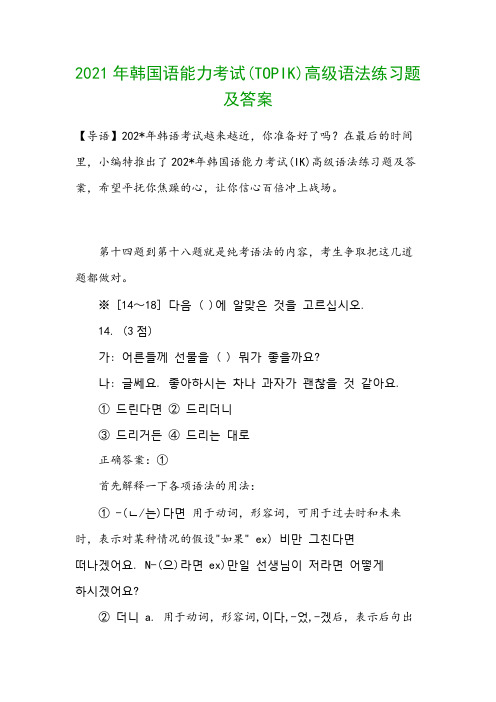
2021年韩国语能力考试(TOPIK)高级语法练习题及答案【导语】202*年韩语考试越来越近,你准备好了吗?在最后的时间里,小编特推出了202*年韩国语能力考试(IK)高级语法练习题及答案,希望平抚你焦躁的心,让你信心百倍冲上战场。
第十四题到第十八题就是纯考语法的内容,考生争取把这几道题都做对。
※ [14~18] 다음 ( )에알맞은것을고르십시오.14. (3점)가: 어른들께선물을 ( ) 뭐가좋을까요?나: 글쎄요. 좋아하시는차나과자가괜찮을것같아요.①드린다면②드리더니③드리거든④드리는대로正确答案:①首先解释一下各项语法的用法:① -(ㄴ/는)다면用于动词,形容词,可用于过去时和未来时,表示对某种情况的假设"如果" ex) 비만그친다면떠나겠어요. N-(으)라면 ex)만일선생님이저라면어떻게하시겠어요?②더니 a. 用于动词,形容词,이다,-었,-겠后,表示后句出现与说话人过去耳闻目睹的事实相反的情况。
ex) 아침에는비가오더니지금은눈이옵니다. b.表示说话人过去耳闻目睹的情况是出现后句结果的原因(主语多为二、三人称)。
ex)동생이그렇게많이먹더니배탈이났어요.③ -거든用于动词,形容词,이다后表示条件或假设“如果”。
ex) 힘들거든쉬었다가하세요. 主要和表示祈使、共动的,以及表示意图、推测的겠다, -(으)ㄹ것이다结合用。
-거든可与-면交换。
-면可用于一般陈述句。
④ -는대로 a. 用于动词后,表示前面的行为或状态一结束,马上做后面的行为“一……就……”。
ex)식사가끝나는대로3층회의실로오십시오. b. 用于动词后,表示仿照前面的去做。
ex) 내가하는대로따라접으세요.题目的意思是:가:( )给老人们送礼的话,什么样的礼物比较好? 나:这个嘛,我觉得送喜欢的茶或者点心应该挺好的。
光看字面意思第一项和第三项好像都可以,但是③ -거든虽然也是有如果的意思,但是它主要还是讲的既定事实,即“要是……那么就……”,因此答案还是选①드린다면。
topik分数标准
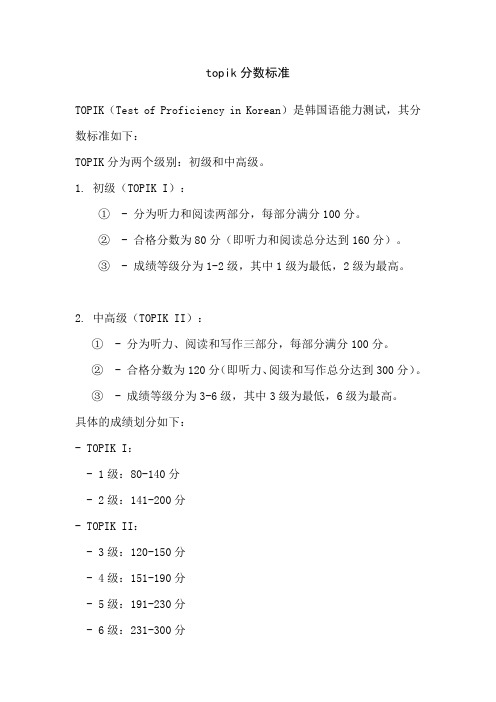
topik分数标准
TOPIK(Test of Proficiency in Korean)是韩国语能力测试,其分数标准如下:
TOPIK分为两个级别:初级和中高级。
1. 初级(TOPIK I):
①- 分为听力和阅读两部分,每部分满分100分。
②- 合格分数为80分(即听力和阅读总分达到160分)。
③- 成绩等级分为1-2级,其中1级为最低,2级为最高。
2. 中高级(TOPIK II):
①- 分为听力、阅读和写作三部分,每部分满分100分。
②- 合格分数为120分(即听力、阅读和写作总分达到300分)。
③- 成绩等级分为3-6级,其中3级为最低,6级为最高。
具体的成绩划分如下:
- TOPIK I:
- 1级:80-140分
- 2级:141-200分
- TOPIK II:
- 3级:120-150分
- 4级:151-190分
- 5级:191-230分
- 6级:231-300分
需要注意的是,TOPIK的评分标准可能会有所调整,以上信息仅供参考,具体以韩国国立国际教育院发布的最新官方信息为准。
韩语TOPIK考试初级练习题及答案
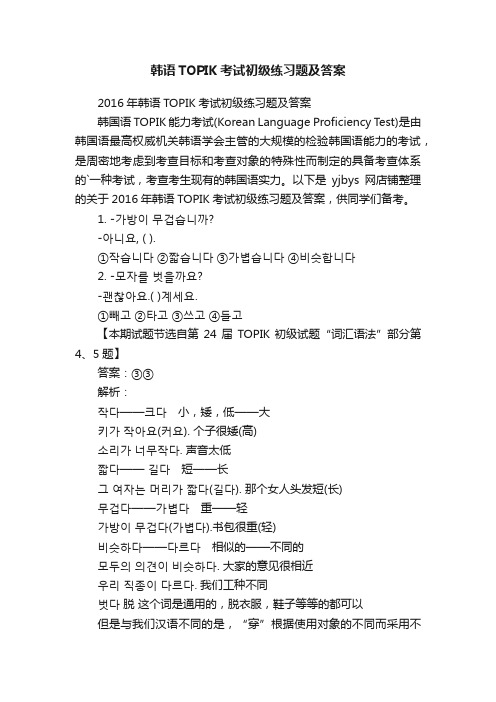
韩语TOPIK考试初级练习题及答案2016年韩语TOPIK考试初级练习题及答案韩国语TOPIK能力考试(Korean Language Proficiency Test)是由韩国语最高权威机关韩语学会主管的大规模的检验韩国语能力的考试,是周密地考虑到考查目标和考查对象的特殊性而制定的具备考查体系的`一种考试,考查考生现有的韩国语实力。
以下是yjbys网店铺整理的关于2016年韩语TOPIK考试初级练习题及答案,供同学们备考。
1. -가방이무겁습니까?-아니요, ( ).①작습니다②짧습니다③가볍습니다④비슷합니다2. -모자를벗을까요?-괜찮아요.( )계세요.①빼고②타고③쓰고④들고【本期试题节选自第24届TOPIK初级试题“词汇语法”部分第4、5题】答案:③③解析:작다——크다小,矮,低——大키가작아요(커요). 个子很矮(高)소리가너무작다. 声音太低짧다——길다短——长그여자는머리가짧다(길다). 那个女人头发短(长)무겁다——가볍다重——轻가방이무겁다(가볍다).书包很重(轻)비슷하다——다르다相似的——不同的모두의의견이비슷하다. 大家的意见很相近우리직종이다르다. 我们工种不同벗다脱这个词是通用的,脱衣服,鞋子等等的都可以但是与我们汉语不同的是,“穿”根据使用对象的不同而采用不同的搭配,如:목걸이를차다戴项链옷을입다穿衣服신발을신다穿鞋; 양말을신다穿袜子모자를쓰다戴帽子; 안경을쓰다戴眼镜-수미씨가이불고기를만들었어요?-네, 제가요리책을( ) 만들었어요.①보러②봐도③보면서④보거나【本期试题节选自第24届TOPIK初级试题“词汇语法”部分第22题】答案:③翻译: -这烤肉是你做的吗?-是的,我照着书做的(一边看一边做)解析:-(으)면서用于动词词干之后,表示前句和后句的动作同时发生,此时两个动作的发出者必须是同一个人,可翻译为“一边……一边……”例句:1. 텔레비전을보면서밥을먹고있었어요.一边看电视,一边吃饭2. 나는음악을들으면서공부를해요.我边听音乐边学习(듣다听)3. 커피마시면서이야기해요.边喝咖啡边聊天-거나用于动词、形容词词干后面,表示选择关系,可翻译为“或者”例句:1. 주말에집에서책을읽거나친구를만나러갑니다.周末在家读书或者和朋友见面2. 가족을보고싶을때전화를하거나편지를씁니다.想念家人的时候(给他们)打电话或者写信3. 자기전에우유를마시거나운동을합니다.睡觉前喝牛奶或者做运动。
topik中高级大作文真题
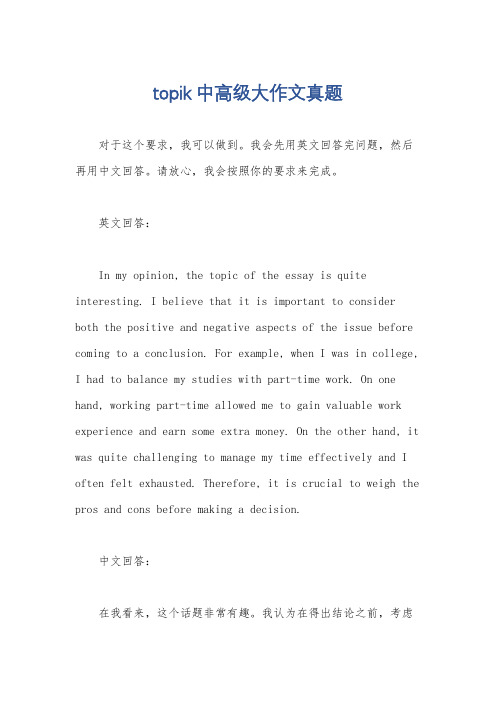
topik中高级大作文真题对于这个要求,我可以做到。
我会先用英文回答完问题,然后再用中文回答。
请放心,我会按照你的要求来完成。
英文回答:In my opinion, the topic of the essay is quite interesting. I believe that it is important to consider both the positive and negative aspects of the issue before coming to a conclusion. For example, when I was in college, I had to balance my studies with part-time work. On one hand, working part-time allowed me to gain valuable work experience and earn some extra money. On the other hand, it was quite challenging to manage my time effectively and I often felt exhausted. Therefore, it is crucial to weigh the pros and cons before making a decision.中文回答:在我看来,这个话题非常有趣。
我认为在得出结论之前,考虑这个问题的积极和消极方面是很重要的。
举个例子,当我上大学的时候,我不得不在学习和兼职工作之间取得平衡。
一方面,兼职工作让我获得了宝贵的工作经验,也赚了一些额外的钱。
另一方面,有效地管理我的时间是非常具有挑战性的,我经常感到筋疲力尽。
因此,在做决定之前,权衡利弊是至关重要的。
韩国语能力考试TOPIK中高级语法汇总

韩国语能力考试TOPIK中高级语法汇总其一1表示假定条件-면(으면)1)表示假定性的条件(该条件是否能实现,是否是现实,说话当时尚不能确定)。
该条件实现了就会有怎样的结果。
相当于汉语的“要是…的话”、“假如”、“如果”(常与“만약,만일”连用,构成“만약(만일)…면(으면)”)。
如:만약수길이가오면나를기다리라고전하여주시오.要是秀吉来了,请转告他,让他等我。
만일바람이불면가지않겠소. 要是刮风,就不去。
속에든것이인화성을띤물건이면위험한데.里面的东西如果是易燃品,就很危险。
2)表示未来要实现而目前尚未实现的条件。
如:이제몇달이지나면일터에나가게됩니다.再过几个月,就要走上工作岗位。
3)表示习惯性、规律性的条件。
相当于汉语的“每到…总是…”、“一…就…”。
如:그는상해에오면꼭우리집에들른다.他来到上海,总要到我家来。
봄이오면꽃이핀다. 一到春天,花就开了。
4)表示一种推理性的假定条件,即假定前面的事实成立的话,就必须进行后面的动作。
这时它前面往往加“았(었,였)”,终结谓语则往往采取“아야(어야,여야) 하다”的形式。
如:일을시작했으면끝을맺어야하지요.事情开始干了,就应干到底。
옳지않다고생각했으면곧고쳐야지.认识到不对的话,就应该改。
5)表示一种并列性的假定条件。
네가노래를부르면내가춤을추는것이어떠냐?你要是唱歌的话,我就跳舞,怎么样?6)表示所希望的条件。
这时它前面与“았(었,였)”连用,后面常与“좋겠다”搭配。
相当于汉语的“要是…的话就好了”。
如:그런이야기를좀더해주셨으면얼마나좋겠어요!再给讲些那样的故事有多好啊!그가여기에와있었으면좋겠는데. 他要是在这里的话就好了。
这时,“면(으면)”后面的“좋겠다”也可省略。
如:엄마, 저도외가집으로갔으면. 妈,我也去外婆家多好啊。
那时他要是健康的话多好啊。
7)表示非现实性的条件,即该条件并非事实(事实正好与此相反),只是作为假想而提出的。
它后面叙述的结果性的事实也不是现实的。
2010年9月高级口译真题与答案课件

2010年9月高级口译考试真题与答案【Spot Dictation】We already live in an over-communicated world that will only become more so in the next tech era. We’ve developed technology that gets us so much information that we’ve got cell phones ringing every second. We’ve got computers and laptops. We’ve got personal organizers. And we’re just being bombarded with communication and every advancing technology seems to create more and more communications at us. We are thought of over-whelmed by the information flow.Research suggests that all the multi-tasking may actually make our brains work better and faster, producing a world-wide increase in IQ up to 20 points and more in recent decades. Is there any real benefit in all these mental gymnastics we now have to go through? We are not becoming a race of global idiots, but many do think certain skills are enhanced and certain are not. You know the ability to make fast decisions, to answer a dozen emails in 5 minutes or to fill out maybe big ap titude text. That’s enhanced.But when someone is out there with his kids laying in his little league, or something like that, he’s got his cell phone in his pocket, he is always wondering: “Jeez, did I get a voicemail?” This might have negative effects on our own brains patterns. Creativity is something that happens slowly. It happens when your brain is just noodling around, just playing. When it puts together ideas which you haven’t thought of, or maybe you have time to read a book. You are a business person but you have time to read a book about history or about a philosopher and something that happened long ago, or something or some ideas, some default of long ago.Actually, it might occur to you that you can think of your own business in that way. And so if this mixture of unrelated ideas that feeds your productivity, feeds your creativity, and if your mind is disciplined to answer every email, then you don’t have time for that playful noodling, you don’t have time for those unexpected conjunctions. So I think maybe we are getting smarter in some senses, but over communication is a threat to our creativity and to our reflection.【Listening Comprehension】Listening Comprehension 1Questions 1 to 5 are based on the following conversation.M: You know in designing this new town, we try to look backward at small town in America, and take the best of those planning elements. Houses close together, sidewalks from the porches, tree-lined streets, easy non-automobile-dependent access to the town center and to your neighbors and to the school and the other institutions that are vital. And we’ve tried to take some of those ideas and update them and come out with a livable, workable place where people can go and re-kindle the sense of community that seems to be missing from suburbs all across the country. W: So give us a sense of how these new towns are designed.M: Houses are all very close together. We were just 10 feet apart from our neighbors on either side of us. And that’s pretty much the standard for the town. So, you have houses that are close together, houses that surround open areas. They have a lot of big parks, a lot of common areas. The theory is that you are willing to sacrificial private yards base. You don’t need a quarter of an acre or half an acre. If you have a public area where you can go and enjoy the facilities there. And, most importantly, you can interact with your neighbors. That helps to create the sense of community. That’s so important to many of these new town developments.W: Now I see this whole sense of community. It’s going to be a new town, but we are going to do it with the sense of nostalgia for the past, like, a lot of the houses had porches.M: yes, it would create a front-porch culture, that people would be out on their porches, talking to their neighbors next door, and to people walking down the street, or people riding their bikes. And that would be this culture that existed 40, 50 or 60 years ago. But that really has been one of the failures that we observed during our 2 years in this new town. And the people don’t spend very much time at all on their front porches. There are a couple of things going on. One is this central Florida and it’s hotter than hell a god part of the year. And sitting on your front porch, even if you have a fun going, can be a very uncomfortable thing. People prefer to be inside in the air-conditioning.W: What were some of the rules you had to live by in the new project? And did any of these rules bother you?M: well, the developer and I have different feelings about rules. His feeling is, if I can summarize these feelings for him, that you move in then knowing the rules, and if you don’t like them, you shouldn’t move in. I have some problems with rules. I just sometimes like to break them. And They just bother me because of their inexistence. But the rules sometimes were silly and sometimes weren’t. They dictated what colo r your curtains could be facing this street, and actually asked a woman with red curtains to remove them.W: really? Is that true?M: And they dictated where you could park your car and for how long. They dictated any sort of thing you could attach to you r house. You couldn’t attach a satellite dish to your house, they dictated forever the color of your house. And they dictate how often you have to repaint your house. They try to go a step further and remove plastic flowers and plastic furniture from that all important front porches. Some rules seem to go a little too far.Questions:1. What are the two speakers talking about?2. There are several planning elements for recreating a sense of community. Which of the following is not one of these elements?3. According to the conversation, what can we learn about the so-called front porch culture?4. Which of the following is not one of the rules that the residents have to live by?5. What does the man think of these rules according to the conversation?Listening Comprehension 2Question 6 to 10 are based on the following newsNew York, USThe biggest Wall Street banks slashed their small business loan portfolios by 9% between 2008 and 2009, more than double the rate at which they cut their overall lending, according to agovernment report released Thursday.The Congressional Oversight Panel report spotlights the role banks, especially the largest ones, played in the credit crunch that has plagued small companies throughout the recession."Big banks pulled back on everyone, but they pulled back harder on small businesses," Elizabeth Warren, the panel's chairwoman.Warren's oversight committee was established to keep tabs on the federal government's financial stabilization effort. The committee's May report focuses on the role her committee played in improving credit access for small companies.Madrid, SpainThe European Union eases trade with Latin America at Madrid summitThe EU plans to boost trade with Latin America despite warnings from some European ministers and farmers, who fear unfair competition.EU negotiations with the Mercosur trade bloc, frozen since 2004, will reopen. The Mercosur group embraces Argentina, Brazil, Paraguay and Uruguay.Trade deals were also reached with Central America, Peru and Colombia, following marathon talks in Madrid. EU Commission president Jose Manuel Barroso said, “We have opened a ground-breaking chapter in the EU relationship with our Latin America and Caribbean partners.” The EU is pursuing regional trade agreements while global trade talks - the so-called Doha Round - have failed to make progress.Tripoli, LibyaMembers of a Dutch family are on their way to Libya after being told that the sole survivor of the plane crash that killed 103 people might be their relative. A member of the Dutch family told the media that officials had told her family the child being treated at a hospital in Tripoli might be her grandson, 9-year-old Ruben van Assouw.The Dutch foreign ministry confirmed that two presumed family members of the injured child were on their way to Tripoli.Ruben had been on safari in South Africa with his brother, mother and father. All of whomperished in the crash, said the newspaper.Sixty-one Dutch citizens were believed killed when the MA Flight 230 from Johannesburg to Tripoli crashed on landing in clear weather at 6am. The Times understands that seven passengers had been due to fly on to London. Two of the dead were Britons and one was Irish.London, the United KingdomTarget Corp posted a higher quarterly profit as consumers loosened their wallets to spend on items including clothing and electronics.The discount retailer said profit was $671 million in the first fiscal quarter that ended May 1, compared with $522 million a year earlier.Target has benefited from consumers becoming a bit more willing to spend on discretionary items such as clothing and home furnishings.The company previously said that sales at stores open at least a year rose 2.8 percent in the first quarter.Bonn, GermanyFears of greater financial regulation across Europe hammered stocks after German measures aimed at limiting speculation were taken to smack of desperation.Stock markets were unnerved by Germany's unilateral ban on certain naked shorts announced late on Tuesday. And the euro suffered a kneejerk reaction, falling more than 1 percent against the yen, as investors saw foreign exchange as the only way to bet against the euro zone.World stocks were down 1.43 percent whilst the more volatile emerging markets index fell 2.64 percent.There were also fears that the debt crisis was about to worsen as some believed Germany's move smacked of desperation.Questions:6. What did the Wall Street banks do between 2008 and 2009 as reported in the news?7. What did the European Union plan to do at the Madrid Summit?8. How many people were killed when the passenger plane from Johannesburg to Tripoli crashed on landing?9. How much profit did Target Corp make in the first quarter of the year?10. What did Germany’s rece nt financial measures aim at?Listening Comprehension 3Questions 11 to 15 are based on the following interview.Man: When most couples married, they may discuss some things in advance like how many children they want or where they want to live. But most of the day-to-day details or problems of married life work out after marriage. Not so with Steven Karen Parsons who have a 15-page prenuptial agreement that states the rules they must follow in almost every aspect of their married life. Today, Karen is here with us.Man: Karen, first I’d like to ask you why you decided to write this agreement. You’ve both bee n married before. Am I right?Woman: Yes, I’ve been married twice and Steve was married once before. So we have some experience about what goes wrong in a marriage.Man: And that’s why you wrote this agreement.Woman: Yes, we found that many problems happen when a person has different expectations from his or her spouse. We want to talk about everything openly and honestly before we start living together. Also, we both know how important it is to respect each other’s quotes. We’re all bothered by things that seems small to someone else, like it used to really bother me when my ex-husband let his dirty clothes on the floor. So we put that in the agreement: dirty clothing must be put in a laundry bag. Now Steve knows what my expectations are.Man: I’m sure that some people hearing this report will think this contract isn’t very romantic. Woman: Well, we disagree. We think it’s very romantic. Disag reement shows that we set down and talked and really try to understand the other person. A lot of problems occur in a marriage because people don’t talk about what they want. That’s right. When we disagree about something, we workout solution. That’s good for both of us. I’d much rather do that than get some romantic gifts like flowers or candy.Man: Some of these rules sound like, well, a business agreement. Many of your rules concern money in some way, even the rules about having children.Woman: In our experience, disagreements about money can cause a lot of problems, so we talked about how we want to spend our money and put that in the agreement as well.Man: So do you spend a lot of time checking on each other to see if the rules are being followed? Woman: No, not at all. And we don’t argue about them, either. As a matter of fact I think we spend less time arguing than most couples. Because we both know what the other person expects. We can spend our time doing things we enjoy and just being with each other.Man: What happens if one of you breaks the rule.?Woman: We don’t think that will be a problem. No, becaus e we do agree on these rules.Man: But what if, say, you don’t want to cook di nner one night, what happens?Woman: Well, we talk about it and reach a compromise. Maybe there’s a good reason.Man: But if you break a lot of rules all the time?Woman: Then we have to ask ‘Is this marriage really working?’ Because if we can’t follow all our own agreement. There’s no point making it.Man: So it sounds like you two are happy with this agreement. Do you think other couples should follow your example and write the prenuptial agreement of their own?Woman: “So a lot of work to write an agreement, but I think it could be useful to a lot of people. Maybe there would be fewer divorces if everyone did this.Questions:11. About which of the following topics is the woman been interviewed?12. What can we learn about the man and the woman from the interview?13. According to the woman, why did so many problems happen in a marriage?14. What does the woman think of this contract?15. What happens if one of the couple sometimes breaks a rule of the contract?Listening Comprehension 4Question 16-20 are based on the following talk.Different cultures often have entirely different perceptions of time. The cultural anthropologist Edward T Hall popularized the idea that cultures use time and view time in very different ways. The idea of the past, present and future and the whole concept of scheduling or managing time can be so different that it leads to cross-cultural miscommunications. In his 1990 book,The Dance of Life, Hall writes time is one of the fundamental bases, on which all cultures rest, and around which all activities revolve. Understanding the difference between monochronic time and polychronic time is essential to success. Hall's notion of monochronism and polychronism can be understood as follows: monochronic time is linear, events scheduled one at a time, one event following another. To a monochronic culture, this type of schedule is valued over interpersonal relationships.On the other hand, polychronic time is characterized by many things happening simultaneously. In addition, interpersonal relationships are highly valued in polychronic cultures. Hall's theory is that monochronic time can be found primarily in North American and northern European cultures. These cultures emphasize schedules, punctuality and preciseness. They also emphasize doing things. They are cultures that value productivity, that value getting things done on time. They view time as something that can be lost, killed or wasted. Or conversely, they view as something that can or should be managed, planed and used efficiently. Polychronic time, on the other hand, can be found primarily in Latin American, African, and Native American cultures. Their conception of time is more connected to natural rhythms. It is connected to the earth, to the seasons. This makes sense when we consider that natural events can occur spontaneously, sporadically or concurrently. Polychronic cultures view time as being somewhat flexible. Since life isn't so predictable, scheduling and being processed simply isn't that important. In addition, relationships with people are valued more than making schedules. There is more value placed on being than on doing.Different cultural perceptions of time can lead to conflict, especially in the business world. The idea of being late versus on time for a meeting, for example, might differ widely between anAmerican business person and a Brazilian. The American business person might be far less tolerant of a Brazilian's late arrival. However, the Brazilian business person might be offended by an American's insistence on punctuality, or on getting right down to business. The Brazilian would generally prefer to finish talking with colleagues first and would not want to cut conversation short in order to make an appointment. Some traditional time management programs used in the business world might not translate well in another culture. Traditional time management programs in the business world emphasize to-do-list and careful scheduling. They are monochronic. However, a business in a polychronic culture might not adjust well to that system. Companies, who impose those monochronic systems on places of business in polychronic cultures, might be guilty of ethno-centrism, which means making their own ethnical cultural values central and not valuing other values. Edward Hall's theory of monochronic and polychronic cultures has been challenged by some critics. Some people think it is overly general. They argue that within any culture group we might find people who think of time differently.In other words, a primarily polychronic culture might have both monochronic and polychronic types of people. The same diversity among individuals might be found in a primarily monochronic culture. Critics of anthropologist like Edward Hall feel that it is more useful to think of time differences among individuals, not just between culture groups.Questions:16. Which of the following topics is the person talking about?17. What can we learn about Monochronism from the cultural anthropologist Edward T Hall?18. Which of the following statements apply to Polychronism according to Edward Hall?19. In the business world, who would prefer to finish talking with colleagues before keeping an appointment?20. Edward Hall's theory has been challenged by some critics. What do these critics think of his theory?【上半场阅读理解第一篇】Congress began 2010 with a bad case of legislative déjàvu. Last year, it approved a $787billion stimulus package meant to "create or save" millions of jobs. President Obama says the stimulus has saved or created as many as 2 million jobs so far. But even if that highly optimistic figure is true, in the real world, over 3 million jobs have been lost since the stimulus was signed into law – a dismal feat all financed with enormous debt. Now Congress is working on another stimulus package, but they're calling it a jobs bill. In December, the House passed a $174 billion "Jobs for Main Street Bill" that would use federal dollars to fund job-creating infrastructure projects, while extending unemployment benefits. Sound familiar?Unemployment remains at about 10 percent and state unemployment insurance funds are running out of money. While the Obama administration works to artificially inflate the number of jobs, the unemployed face diminished opportunities and income security. By 2012, 40 state unemployment trust funds are projected to be empty, requiring $90 billion in federal loans to continue operating. Normally, state unemployment benefits pay jobless workers between 50 and 70 percent of their salaries for up to 26 weeks. But during this recession, Congress has extended those benefits four times. The result is that some workers can now claim benefits for 99 weeks. Now Congress may enact a record fifth extension. What would be wrong with that? Everything. The state-federal unemployment insurance program (UI) is an economic drag on businesses and states. And it's a poor safety net for the unemployed.UI, a relic of the Great Depression, fails workers when they need it most. UI trust funds depend on a state-levied payroll tax on employers. During boom years, these funds are generally flush. But during recessions, they can get depleted quickly. The bind is that to replenish their UI fund, states have to raise payroll taxes. That hurts the bottom line for businesses both large and small. Passed on to workers as a lower salary, high payroll taxes discourage businesses from hiring. During steep recessions, states face a fiscal Catch-22: Reduce benefits or raise taxes. To date, 27 states have depleted their UI funds and are using $29 billion in federal loans they'll have to start repaying in 2011. Other states are slashing benefits. While federal guidelines recommend that states keep one year's worth of unemployment reserves, many states entered the recession already insolvent. When federal loans are exhausted, the only option left is higher payroll taxes – a move sure to discourage hiring and depress salaries.The increasingly small and uncertain payouts of UI are the opposite of income security. Theeffect of UI's eight-decade experiment has been to condition workers to save less for a "rainy day" and instead rely on a system that provides no guarantee. UI limits personal responsibility to save; gradually, individuals find themselves in financial peril. Real reform requires putting employees in charge with individual private accounts and getting the government out of the business of creating illusionary safety nets.Unemployment Insurance Savings Accounts (UISA), by contrast, give workers control of their own income, eliminating the negative effects of the UI program on businesses and budgets. Adopted by Chile in 2003, UISAs are also financed via a payroll tax on individual workers and employers. The difference is the money is directly deposited into the individual worker's account. Basically a form of forced savings, UISAs allow individuals to draw on their own accounts during periods of unemployment and roll unused funds into their savings upon retirement. With the burden reduced on employers, wages rise, leading to greater contributions to the individual's fund. The federal government is removed from the picture, and all workers are guaranteed a savings account upon retirement.UISAs liberate workers from uncertainty and improve incentives. When unemployed workers must rely on their own funds rather than the common fiscal pool, they find jobs faster. Congress's repeated extensions of the current UI program may be well intended, but they may also be counterproductive. Like any deadline extension, additional jobless benefits diminish the job seeker's urgency, all at taxpayers' expense.Today, expanded UI benefits mean higher state payroll taxes, which make it harder for employers to expand hiring or raise wages. UISAs, on the other hand, make the payroll tax on business part of the employer's investment in an individual worker, rather than a penalty for doing business. In 2010, it's time to say goodbye to the problems created by broken policies. Congress should start this decade with a promise for true economic freedom: Let businesses create jobs and let workers keep what they've earned.【上半场阅读理解第二篇】LIKE the space telescope he championed, astronomer Lyman Spitzer faced some perilousmoments in his career. Most notably, on a July day in 1945, he happened to be in the Empire State building when a B-25 Mitchell bomber lost its way in fog and crashed into the skyscraper 14 floors above him. Seeing debris falling past the window, his curiosity got the better of him, as Robert Zimmerman recounts in his Hubble history, The Universe in a Mirror. Spitzer tried to poke his head out the window to see what was going on, but others quickly convinced him it was too dangerous.Spitzer was not the first astronomer to dream of sending a telescope above the distorting effects of the atmosphere, but it was his tireless advocacy, in part, that led NASA to launch the Hubble Space Telescope in 1990. Initially jubilant, astronomers were soon horrified to discover that Hubble's 2.4-metre main mirror had been ground to the wrong shape. Although it was only off by 2.2 micrometres, this badly blurred the telescope's vision and made the scientists who had promised the world new images and science in exchange for $1.5 billion of public money the butt of jokes. The fiasco, inevitably dubbed "Hubble Trouble" by the press, wasn't helped when even the limited science the crippled Hubble could do was threatened as its gyroscopes, needed to control the orientation of the telescope, started to fail one by one.By 1993, as NASA prepared to launch a rescue mission, the situation looked bleak. The telescope "probably wouldn't have gone on for more than a year or two" without repairs, says John Grunsfeld, an astronaut who flew on the most recent Hubble servicing mission. Happily, the rescue mission was a success. Shuttle astronauts installed new instruments that corrected for the flawed mirror, and replaced the gyroscopes. Two years later, Hubble gave us the deepest ever view of the universe, peering back to an era just 1 billion years after the big bang to see the primordial building blocks that aggregated to form galaxies like our own.The success of the 1993 servicing mission encouraged NASA to mount three more (in 1997, 1999 and 2002). Far from merely keeping the observatory alive, astronauts installed updated instruments on these missions that dramatically improved Hubble's power. It was "as if you took in your Chevy Nova [for repairs] and they gave you back a Lear jet," says Steven Beckwith, who from 1998 to 2005 headed the Space Telescope Science Institute (STScI) in Baltimore, Maryland, where Hubble's observations are planned. Along the way, in 1998, Hubble's measurements of supernovas in distant galaxies unexpectedly revealed that the universe is expanding at anever-increasing pace, propelled by a mysterious entity now known as dark energy. In 2001 the space observatory also managed to make the first measurement of a chemical in the atmosphere of a planet in an alien solar system.Despite its successes, Hubble's life looked like it would be cut short when in 2004, NASA's then administrator Sean O'Keefe announced the agency would send no more servicing missions to Hubble, citing unacceptable risks to astronauts in the wake of the Columbia shuttle disaster of 2003, in which the craft exploded on re-entry, killing its crew. By this time, three of Hubble's gyroscopes were already broken or ailing and no one was sure how long the other three would last. Citizen petitions and an outcry among astronomers put pressure on NASA, and after a high-level panel of experts declared that another mission to Hubble would not be exceptionally risky, the agency reversed course, leading to the most recent servicing mission, in May 2009.No more are planned. The remainder of the shuttle fleet that astronauts used to reach Hubble is scheduled to retire by the year's end. And in 2014, NASA plans to launch Hubble's successor, an infrared observatory called the James Webb Space Telescope, which will probe galaxies even further away and make more measurements of exoplanet atmospheres.According to Grunsfeld, now STScI's deputy director, plans are afoot for a robotic mission to grab Hubble when it reaches the end of its useful life, nudging it into Earth's atmosphere where most of it would be incinerated. Only the mirror is sturdy enough to survive the fall into an empty patch of ocean.But let's not get ahead of ourselves - Hubble is far from finished. The instruments installed in May 2009, including the Wide Field Camera 3, which took this image of the Butterfly nebula, 3800 light years away, have boosted its powers yet again. It might have as much as a decade of life left even without more servicing. "It really is only reaching its full stride now, after 20 years," says Grunsfeld.A key priority for Hubble will be to explore the origin of dark energy by probing for it at earlier times in the universe's history. Hubble scientist Malcolm Niedner of NASA's Goddard Space Flight Center in Greenbelt, Maryland, is not willing to bet on what its most important discovery will be. "More than half of the most amazing textbook-changing science to emerge from this telescope occurred in areas we couldn't even have dreamed of," he says. "Expect the。
韩国语TOPIK能力考试高级卷二真题2013年10月_真题(含答案与解析)-交互

韩国语TOPIK能力考试高级卷二真题2013年10月(总分60, 做题时间120分钟)듣기 (1번~ 30번)SSS_SIMPLE_SIN1.A B C D分值: 1答案:DSSS_SIMPLE_SIN2.A B C D分值: 1答案:BSSS_SIMPLE_SIN3.A B C D分值: 1答案:CSSS_SIMPLE_SIN4.A B C D分值: 1答案:BSSS_SIMPLE_SIN5.A B C D分值: 1答案:ASSS_SIMPLE_SIN6.A B C D分值: 1答案:BSSS_SIMPLE_SIN7.A B C D分值: 1答案:CSSS_SIMPLE_SIN8.A B C D分值: 1答案:DSSS_SIMPLE_SIN9.A B C D分值: 1答案:CSSS_SIMPLE_SIN10.A B C D分值: 1答案:CSSS_SIMPLE_SIN11.A B C D分值: 1答案:ASSS_SIMPLE_SIN12.A B C D分值: 1答案:DSSS_SIMPLE_SIN13.A B C D分值: 1答案:CSSS_SIMPLE_SIN14.A B C D分值: 1答案:BSSS_SIMPLE_SIN15.A B C D分值: 1答案:CSSS_SIMPLE_SIN16.A B C D分值: 1答案:BSSS_SIMPLE_SIN17.A B C D分值: 1答案:ASSS_SIMPLE_SIN18.A B C D分值: 1答案:BSSS_SIMPLE_SIN19.A B C D分值: 1答案:ASSS_SIMPLE_SIN20.A B C D分值: 1答案:DSSS_SIMPLE_SIN21.A B C D分值: 1答案:DSSS_SIMPLE_SIN22.A B C D分值: 1答案:BSSS_SIMPLE_SIN23.A B C D分值: 1答案:DSSS_SIMPLE_SIN24.A B C D分值: 1答案:ASSS_SIMPLE_SIN25.A B C D分值: 1答案:ASSS_SIMPLE_SIN26.A B C D分值: 1答案:DSSS_SIMPLE_SIN27.A B C D分值: 1答案:ASSS_SIMPLE_SIN28.A B C D分值: 1答案:CSSS_SIMPLE_SIN29.A B C D分值: 1答案:DSSS_SIMPLE_SIN30.A B C D分值: 1答案:C읽기(31번~ 60번)SSS_SIMPLE_SIN31.A B C D分值: 1答案:BSSS_SIMPLE_SIN32.A B C D分值: 1答案:BSSS_SIMPLE_SIN33.A B C D分值: 1答案:CSSS_SIMPLE_SIN34.A B C D分值: 1答案:DSSS_SIMPLE_SIN35.A B C D分值: 1答案:CSSS_SIMPLE_SIN36.A B C D分值: 1答案:BSSS_SIMPLE_SIN37.A B C D分值: 1答案:ASSS_SIMPLE_SIN38.A B C D分值: 1答案:DSSS_SIMPLE_SIN39.A B C D分值: 1答案:BSSS_SIMPLE_SIN40.A B C D分值: 1答案:CSSS_SIMPLE_SIN41.A B C D分值: 1答案:CSSS_SIMPLE_SIN42.A B C D分值: 1答案:CSSS_SIMPLE_SIN43.A B C D分值: 1答案:CSSS_SIMPLE_SIN44.A B C D分值: 1答案:ASSS_SIMPLE_SIN45.A B C D分值: 1答案:ASSS_SIMPLE_SIN46.A B C D分值: 1答案:BSSS_SIMPLE_SIN47.A B C D分值: 1答案:CSSS_SIMPLE_SIN48.A B C D分值: 1答案:ASSS_SIMPLE_SIN49.A B C D分值: 1答案:DSSS_SIMPLE_SIN50.A B C D分值: 1答案:DSSS_SIMPLE_SIN51.A B C D分值: 1答案:BSSS_SIMPLE_SIN52.A B C D分值: 1答案:DSSS_SIMPLE_SIN53.A B C D分值: 1答案:ASSS_SIMPLE_SIN54.A B C D分值: 1答案:ASSS_SIMPLE_SIN55.A B C D分值: 1答案:DSSS_SIMPLE_SIN56.A B C D分值: 1答案:ASSS_SIMPLE_SIN57.A B C D分值: 1答案:DSSS_SIMPLE_SIN58.A B C D分值: 1答案:BSSS_SIMPLE_SIN59.A B C D分值: 1答案:DSSS_SIMPLE_SIN60.A B C D分值: 1答案:C1。
